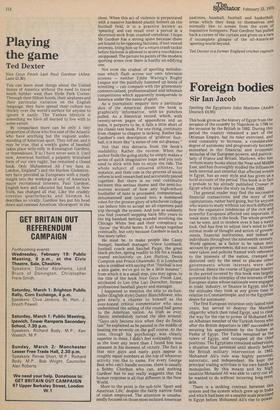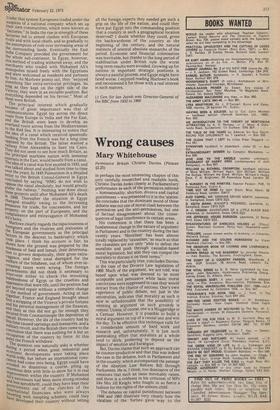Foreign bodies
Sir Ian Jacob
Spoiling the Egyptians John Marlowe (Andre Deutsch £4.95)
This book gives us the history of Egypt from the invasion of the country by Napoleon in 1798 to the invasion by the British in 1882. During this period the country remained a part of the Ottoman Empire, but its ruler exercised, and tried constantly to increase, a considerable degree of autonomy and progressively became enmeshed in the financial and economic tentacles of the European powers, and particularly of France and Britain. Marlowe, who has written many books about the Near and Middle East, and has thoroughly studied the influences both internal and external that affected events in Egypt, has an easy style and has given us a lucid account of the period. This book is in fact a prelude to his already published Cromer in Egypt which takes the story on from 1882.
The general reader may find the successive financial transactions, and the story of the capitulations, rather hard going, but for anyone who wants to study without too much difficulty how the expansive tendencies of the rich and powerful Europeans affected one important, if weak state, this is the book. The whole process can be seen, and to modern eyes it has a nasty look. One has first to adjust one's mind to the normal mode of thought and action of governments, financial institutions, and indeed of individuals throughout the nineteenth centurY. World opinion, as a factor to be taken into account by governments, did not exist. Actions were taken and policies framed with reference to the interests of the nation, cramped or distorted only by the need to placate other governments whose interests were also involved. Hence the course of Egyptian historY in the period covered by this book was largely governed by the interplay of the interests of the European states whose nationals were engaged in trade, industry, or finance in Egypt, and by the attitudes they took at any given time in relation to Constantinople, and to the Egyptian desire for autonomy.
The first European incursion only lasted nine years, but served to• destroy the MamItIR oligarchy which then ruled Egypt, and to clear the way for the rise to power of Mohamed Ali, an Albanian member of the Turkish forces who after the British departure in 1807 succeeded in securing his appointment by the Sultan as Pasha of Egypt. The Turks remained as the rulers of Egypt, and occupied all the chief positions. The Egyptians remained subservient, a situation that persisted until shortly before the British military intervention in 1882. Mohamed Ali's rule was highly personal, autocratic, and independent. He kept the principal trading activities in his own hands as monopolies. By this means and by high taxation Mohamed Ali was able to carry out all: hewanted to do without incurring long-terra debt.
There is a striking contrast between this system and the system which grew up in India and which had been on a smaller scale practised in Egypt before Mohamed Ali's rise to power.
Under that system Europeans traded under the auspices of a national company which set up their own communities, which were known as "factories." In India the rise in strength of these factories led to armed clashes with European rivals and with local chiefs, and so gradually to the assumption of rule over increasing areas of the surrounding lands. Eventually the East India Company provided the government for the whole sub-continent. In Egypt, however, this method of trading withered away, and the merchants who traded with Mohamed Al's monopolies mixed freely with the Egyptians and were welcomed as residents and partners by him. As Marlowe points out, they "enjoyed something like extra-territorial privileges. So long as they kept on the right side of the Viceroy, they were in an enviable position. But everything depended on his favour." Most of them were British. The principal interest which gradually became of great importance was that of communications. Egypt lay across the direct route from Europe to India and the Far East, and the British were keen to develop an overland route across from the Mediterranean to the Red Sea. It is interesting to notice that ,the idea of a canal which received spasmodic backing from the French was for a long time oPPosed by the British. The latter wanted a railway from Alexandria to Suez via Cairo. They did not seem to see how much Britain, as the principal maritime nation with immense interests in the East, would benefit from a canal. The idea of a canal was first mooted in 1833, and Was talked about and studied from time to time 0, ver the years. In 1845 Palmerston in a detailed
letter to the British Consul-General in Egypt
concluded by saying "HMG do not wish to oPPose the canal absolutely, but would greatly Prefer the railway." Nothing was done about these projects until after Mohamed Ali's death 10, 1849. Thereafter the situation in Egypt cnanged steadily owing to the increasing Pressures for trade, for concessions, and for Property on the part of Europeans, and the complaisance and extravagance of Mohamed Ali's heirs. Marlowe clearly regards the rapaciousness ot ,Treigners and the rivalries and jealousies of `-'1e European governments as the principal factors in the descent to bankruptcy which took place. I think his account is fair; he shows how the ground was prepared by the eakness of Said and Ismail, their determinal" togovern despotically, their gross extravagance, and their total disregard for the Welfare of the fellaheen, out of whom ever-increasing taxes were wrung. The foreign governments did not think it necessary to Mtervene either to check the mounting Indebtedness of Egypt or the cruelties and °PPression that were rife, until the position had got repair without a complete change
the method of government. Acting at last 'Nether, France and England brought about first a stripping of the Viceroy's private fortune and his personal management of the finances, and then as this did not go far enough they ecured from Constantinople the deposition of .tishr.nail. However, the ills of the country had by
l8 time caused uprisings and massacres, and a military revolt, and the British then came to the conclusion that there was nothing for it but an „uccuPation of the country by force. At this Point the French withdrew. di,T,,,he question one naturally asks is whether period when great industrial and 1,;°Ylornic developments were taking place c. orld-wide, but before an international conscience had come into being, Egypt could have 'voided so disastrous a course, piling up enorrn
ous debt with little to show for it in real
Ar°vement within the country. If Mohamed an.ds,successors had been more strong-minded go,,:eSs spendthrift, could they have kept their ,7rnments out of the clutches of the 1-10flational financiers who were always with tempting schemes, could they ueveloped their country without letting all the foreign experts they needed get such a grip on the life of the nation, and could they have put Egypt into the commanding position that a country in such a geographical location deserved? I doubt whether they could, given the backwardness of the country at the beginning of the century, and the natural instincts of oriental absolute monarchs of the period. Economic and financial colonisation was inevitable, but thanks to the long period of stabilisation under British rule the worst long-term results were avoided. Growing up for nations in important strategic positions is always a painful process, and Egypt might have fared worse. [enjoyed reading Marlowe's book and recommend it for those with a real interest in such matters.
Lt Gen Sir Ian Jacob was Director-General of the BBC from 1952 to 1960



































 Previous page
Previous page